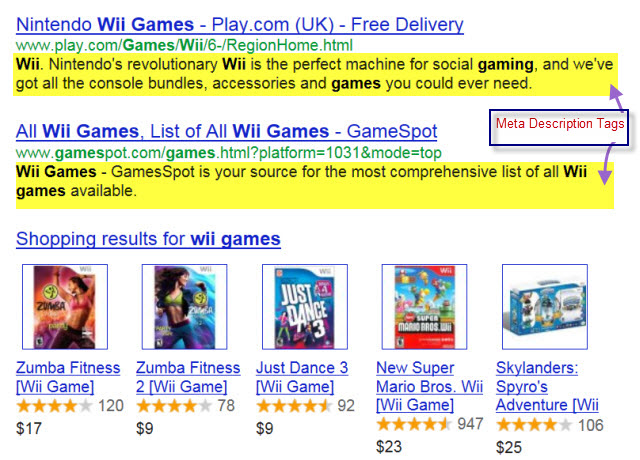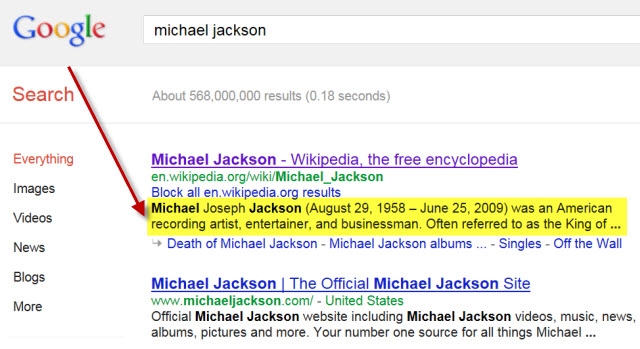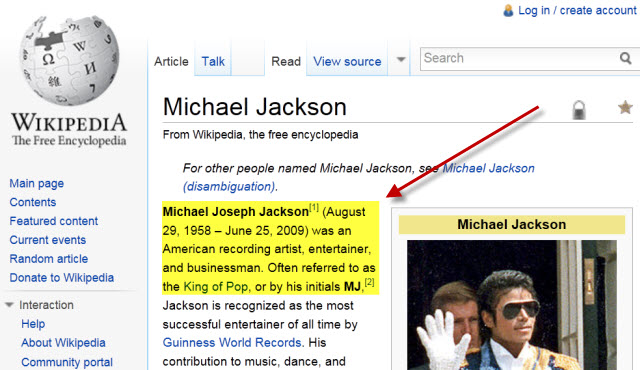
Posted by
Rank Ranger
There is some disagreement among SEOs regarding the exact influence the Meta Description Tag has on how successful your webpage will be. Some say not to bother with one, while others say they are vital. To understand why there are so many different opinions on the matter, let’s understand why Meta Description Tags are important, what they are, and how you can use them.
To help explain the influence of Meta Description Tags, we will first look at an example: If you were looking for NIntendo Wii games, which result would you click on?
And what about this result?

Why is a Meta Description Tag important?
As a typical web surfer you will likely be deciding where to click based on three primary factors – title relevance, ranking, and the quality of the description. The last of the three is exactly what the Meta Description Tag is. Notice that the description underneath the title of the last example in the previous section was poorly phrased and not enticing, to say the least. If you are ranked in the same area as several other websites, what can define whether your site is clicked on can be the Meta description tag; a good short description can go a long way.
If all websites on the page have a highly optimized title, then you will not be differentiating your page on the search engine results pages. Given that the rankings are roughly in the same region or location on the page, the Meta description may be what sets you apart. If you can pitch a concise, convincing marketing piece that grabs the reader, and does so better than your competition, you may be able to steal the click-throughs that could have been headed to sites ranked above yours. Another factor to remember is that when your webpage is linked to by social media websites such as Facebook and Google+, the Meta description can appear as the description of an article of yours. For example:

A curious socialite may not take your link seriously if they see that your description seems like a jumbled up title brought together by Google.
What is a Meta Description Tag?
The Meta Description Tag is the text that immediately follows the title on the Search Engine Results Page. While the title is a factor in Google’s search ranking, the Meta tag is not. However, what is interesting about the Meta tag is what it can offer you other than rankings. The aim of the Meta description is similar to that of the title. It is there to provide a concise and relevant overview of the webpage that the title links to. In addition to simply displaying the results that may be of interest to you, search engines such as Google will also put where your query keywords appear, in the Meta Description Tag, in bold typeface. To view an example of how the Meta Description Tag is seen in the search engine pages, we should look back at the example of a bad tag given earlier. The paragraph with highlighted text is the Meta Description Tag.

In HTML code it looks like this (for an unrelated website):

How can I use a Meta Description Tag?
The Meta Description Tag can be leveraged to improve your click–through rate much in the same way a title can. Through a concise Meta description tag, you can convince searchers that yours is the site worth visiting. Moreover, social networks often use your Meta description tag when linking to your site. Remember to keep the characters in the Meta description tag at around 150 characters, so that your description is not truncated by Google’s infamous “…” which, gives off the impression of unfinished text.
An example of a cut off Meta Description tag can be seen below.

If your sole concern is an improvement in ranking, you may choose to not define a Meta tag at all. In a case where you have decided not to define a Meta description tag, Google will automatically create one for you. This will be done in a number of ways. It will either be done through taking a snippet of the first line of content on a page, a line from a sentence that has the search query keyword in it, or in some cases the search engines might use the description of your webpage on online directories (such as DMOZ).
In the above and following example, we can see a page that has not had a Meta Description Tag defined for it. Google instead takes information from the page itself:

Keep in mind that if you are targeting long tail keywords, there may be a large number of keywords involved in a search which reached your page. In cases such as these, it is sometimes beneficial for Google to decide the Meta description of your site for itself, as it will put together on page text which includes keywords that the searcher used, that you may not have optimized for had you defined the Meta description tag yourself.
If you have any questions or thoughts on this topic, we would **** to hear from you – post your comments below!



